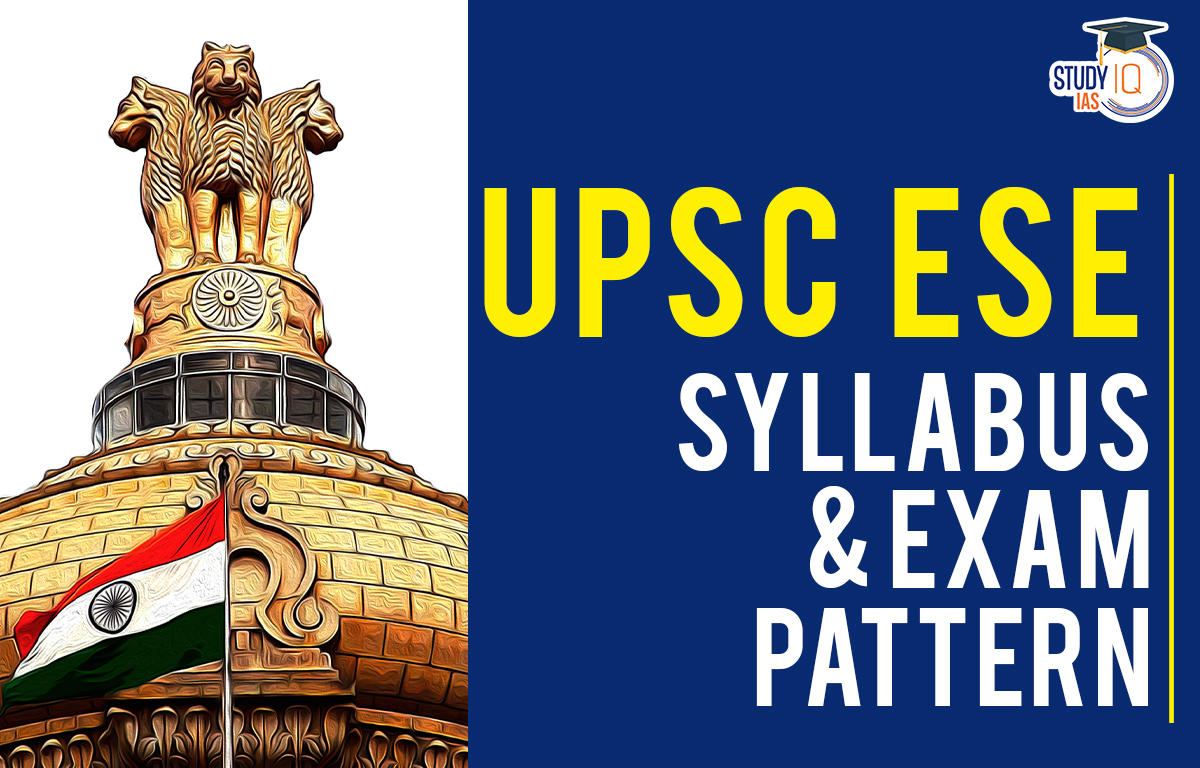Table of Contents
UPSC ESE Syllabus
UPSC ESE Syllabus: UPSC has released the notification for UPSC ESE Exam 2023 for a total of 327 posts. The preliminary examination will take place on February 19, 2023. Candidates who are preparing for this exam can check the UPSC ESE Syllabus 2023 both for prelims and mains examination.
UPSC ESE Exam 2023 Overview
The preliminary examination consists of two papers; paper 1 has questions based on general studies and engineering aptitude, while paper 2 has questions based on the candidate’s chosen engineering stream. Additionally, there are two descriptive papers in the UPSC IES mains exam. The mains exam questions are solely dependent on the candidate’s chosen engineering specialty. The candidates can check the overview of the UPSC ESE Exam 2023.
|
UPSC ESE Exam 2023 Overview |
|
| Particulars | Details |
| Name of the Exam | UPSC ESE 2023 |
| Exam Conducting Body | Union Public Service Commission |
| Mode of Application | Online Mode |
| Mode of Exam | Offline Mode |
| Number of Vacancies | 327 Posts |
| Notification Date | 14th September 2022 |
| UPSC ESE Application Last Date | 4th October, 2022 |
| UPSC ESE Prelims Exam | 19th February 2023 |
| UPSC ESE Prelims Result | March 2023 |
| UPSC ESE Mains Exam | 25th June 2023 |
| UPSC ESE Interview | To be Notified |
| Number of Attempts | 6 attempts |
| Stages of Exam | Exam has 3 Stages
|
| Official Website | www.upsc.gov.in |
UPSC ESE Syllabus 2023
Both the preliminaries and the mains of the UPSC IES (Indian Engineering Services) examination are written examinations. The first of the two exams in the preliminary examination will contain questions on general knowledge and engineering aptitude that apply to all applicants. The questions in Paper 2 will be based on the stream.
Two descriptive papers based on the engineering stream will be included in the mains exam. We will cover the UPSC IES syllabus for Civil, Electrical, Mechanical, Electronics, and Telecommunication since the exam is subject-specific. The UPSC ESE Syllabus for each topic is listed below in detail in the PDF.
UPSC ESE Syllabus for Prelims
Questions in this part will be focused on current news and events as well as the fundamentals of engineering. The following is a list of crucial subjects:
|
UPSC IES Syllabus |
|
|
|
UPSC ESE Syllabus for Mains
The table below is a list of the topics covered in the civil engineering, electronics and telecommunications engineering, electrical engineering, mechanical engineering, main exam syllabuses.
Download UPSC ESE Syllabus for Mains PDF
UPSC ESE Exam Pattern
Preliminary exam, main exam, and personality test are the three steps of the UPSC IES/ESE selection process. Both the preliminaries and mains exams’ UPSC IES Exam Patterns have been thoroughly covered.
UPSC ESE Exam Pattern for Prelims
Two papers—one on engineering discipline and the other on general studies and engineering aptitude—will make up the prelims test. These two papers will be of the objective variety. Each incorrect response will result in a deduction of one-third of the total marks.
| Paper | Subject | Total Marks | Duration (hours) |
| Paper 1 | General Studies & Engineering Aptitude | 200 | 2 hours |
| Paper 2 | Concerned Engineering Stream | 300 | 3 hours |
| Total | 500 | – | |
UPSC ESE Exam Pattern for Mains
Two papers from the relevant engineering stream that the candidate choose will make up the mains exam. Both essays will be descriptive in style. The mains examination will have six papers, each worth 300 points for a total of 600 points.
|
UPSC IES Mains Exam Pattern |
||
| Papers | Marks | Duration |
| Paper 1 Civil/Electrical/ Mechanical/ Electronics & Telecommunication | 300 | 3 Hours |
| Paper 2 Civil/Electrical/ Mechanical/ Electronics & Telecommunication | 300 | 3 Hours |
| Total | 600 Marks | 6 Hours |
UPSC ESE Personal Interview
The interview round carries a 200-point maximum. Personal interviews are centred on your overall personality. A wonderful persona is reflected in their positive outlook, astute body language, effective communication, and current-affairs knowledge. Furthermore, having strong technical knowledge can make a great impression in face-to-face interviews. You will be better prepared if you are familiar with the prior UPSC IES Interview. You have to continually evaluating yourself. You must be





















 WhatsApp
WhatsApp